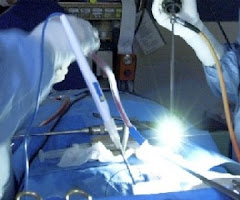Patients suffering from chronic back pain due to a herniated disc usually try a succession of recommended and prescribed remedies to help ease their comfort. Because of major advancements in medical technology, now those suffering from this common problem no longer have to live with that pain.
Patients diagnosed with a herniated disc may have pain in the back, leg, neck or arm, or a weakness of the lower extremity muscles. When a disc herniation occurs, the cushion that sits between the spinal vertebrae is pushed outside its normal position. A herniated disc would not be a problem if it weren't for the spinal nerves that are very close to the edge of these spinal discs.
Causes of Herniated Discs
A herniated disc may occur suddenly in an event such as a fall or an accident, or may occur gradually with repetitive straining of the spine. However, disc material degenerates naturally as you age, and the ligaments that hold it in place begin to weaken. As this degeneration progresses, a relatively minor strain or twisting movement can cause a disc to rupture.
Certain individuals may be more vulnerable to disc problems, and as a result may suffer herniated discs in several places along the spine. Research has shown that a predisposition for herniated discs may exist in families, with several members affected.
Symptoms
Symptoms vary greatly depending on the position of the herniated disc and the size of the herniation. If the herniated disc is not pressing on a nerve, the result may be a low backache or no pain at all. If it is pressing on a nerve, there may be pain, numbness, or weakness in the area of the body to which the nerve travels. Typically, a herniated disc is preceded by an episode of low back pain or a long history of intermittent episodes of low back pain.
Herniated discs are most common in the lumbar spine--the part of your backbone between the bottom of your ribs and your hips. Symptoms include:
• Severe low back pain
• Pain radiating to the buttocks, legs, and feet
• Pain made worse with coughing, straining, or laughing
• Tingling or numbness in legs or feet
• Muscle weakness or atrophy in later stages
• Problems with bowel and bladder
• Muscle spasm
Herniated cervical discs are far less common than lumbar disc herniation because there is substantially less pressure placed across this part of the spine. Symptoms of a herniated cervical disc include:
• Neck pain, especially in the back and sides
• Deep pain near or over the shoulder blades on the affected side
• Pain radiating to the shoulder, upper arm, forearm, and rarely the hand, fingers or chest
• Pain made worse with coughing, straining, or laughing
• Increased pain when bending the neck or turning head to the side
• Spasm of the neck muscles
• Arm muscle weakness
Treatment for Herniated Discs
Fortunately, the majority of herniated discs do not require surgery. However, a very small percentage of people with herniated, degenerated discs may experience symptomatic or severe and incapacitating pain that significantly affects their daily life.
The initial treatment for a herniated disc is usually conservative and nonsurgical. Your doctor may prescribe bed rest, or advise you to maintain a low, painless activity level for a few days to several weeks. This helps the spinal nerve inflammation to decrease.
Traditional conservative treatments include ice, ultrasound, electrical stimulation, cortisone injections, anti-inflammatory medications and physical therapy. While these may deliver some relief, it will usually be only temporary.
But the major concern with these traditional treatments is that they cannot fix or heal a herniated disc as they do not address the actual cause of the problem.
Individuals who undergo a series of open back surgeries or fusion surgeries for herniated disc pain experience a lower level of pain relief. Up to 30% of those who undergo surgery have unsatisfactory results, as stated in a Practice Guideline developed for the Aerospace Medical Association by the American Society of Aerospace Medicine Specialists. Herniated disc open or fusion surgery is an involved procedure whose high failure rate can produce more pain than relief.
New Technology Speeds Return to Active Lifestyle
With advances in science and technology, there are alternatives to open or fusion spine surgeries. A proven alternative for helping to alleviate the pain of a herniated disc is The Bonati Proceduressm.
Subscribe to:
Post Comments (Atom)


2 comments:
I totally agree that treating herniated disc can be both difficult and trying. The more folks can get educated the better. It doesn't have to mean a lifetime of pain, if you know the facts, follow solid guidance and take care of symptoms before they become a chronic issue with little help.
Thanks a bunch for sharing this with all people you actually recognize what you are talking about!
Bookmarked. Kindly also discuss with my website.
lower back pain spasms treatment
Post a Comment